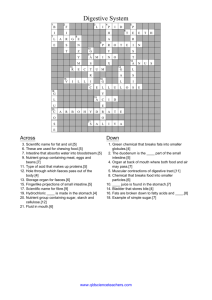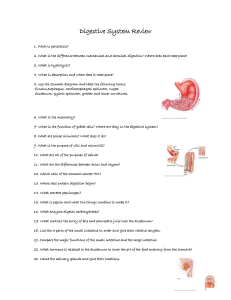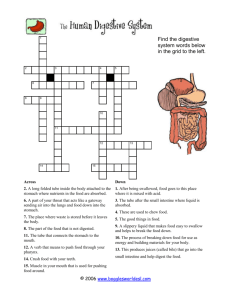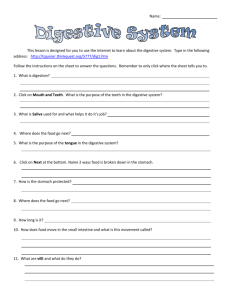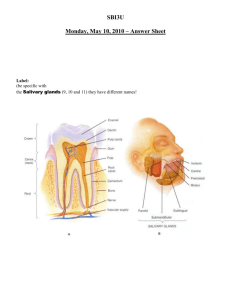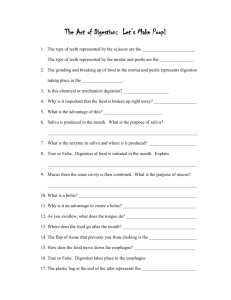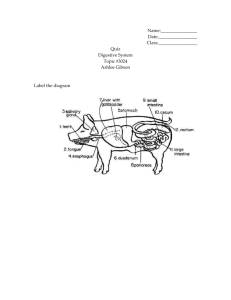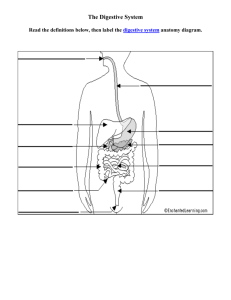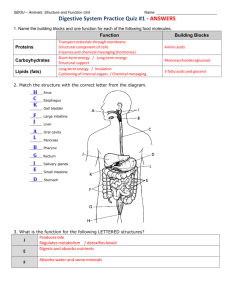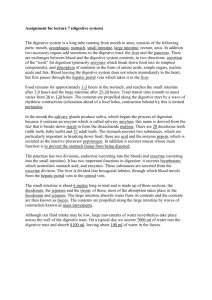The Digestive System
advertisement
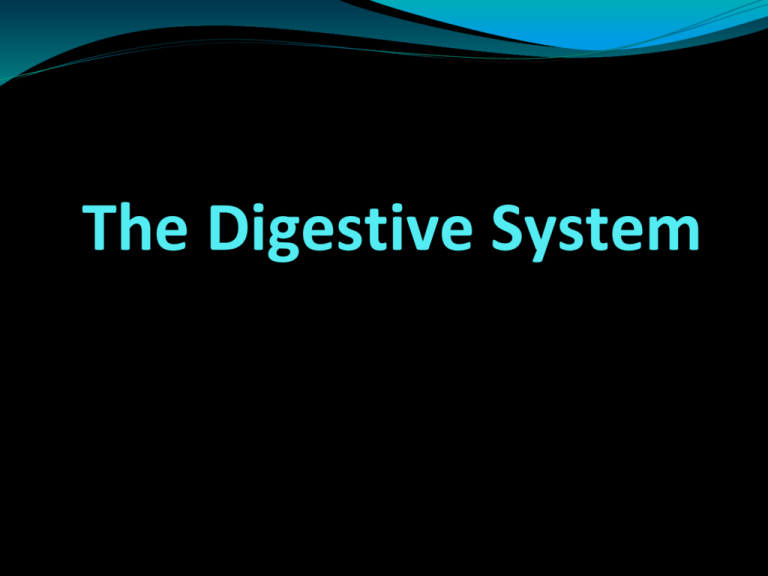
The Digestive System Stages of Food Processing Ingestion Taking in of nutrients Digestion Breakdown of complex organic molecules into smaller components by physical and chemical means Absorption Taking up of digested molecules into the cells of the digestive tract Egestion Removal of waste food materials from the body Appearance of the Digestive System Humans ● Digestive system is one long tube, open at both ends ● Gastrointestinal tract/alimentary canal Birds ● One long tube that will store, grind up, and absorb food Perch (Fish) ● One long tube similar to humans Rat ● Very similar to humans – really only size that varies ● One long tube that goes from mouth to anus Let’s Start at the Top Mouth ● Digestion begins here ● Teeth begin the physical breakdown of food ● Action of chewing stimulates salivary glands (parotid, sublingual & submandibular) ● Saliva: water, mucus (mucin) & enzymes that breaks down carbs into maltose (amylase) ● Tongue: forms bolus out of food Neck Area ● Pharynx: double purpose tube – bolus from mouth comes to pharynx to get to digestive tract ● Epiglottis: flap over your airway to make sure food does not go down ● Esophagus: tube that joins the mouth and the stomach. Food moves down by smooth muscle contractions “peristalsis” Stomach ● Movement in and out of the stomach is controlled by sphincters – like drawstrings on a bag ● Stomach has 3 muscle layers – contract/relax to churn food ● Cells in stomach lining secrete gastric juice (HCl + enzymes) and mucus ● HCl + enzymes break down fibrous food ● HCl kills foreign invaders ● Mucus protects the stomach lining Stomach ● Our stomach is super acidic – without mucus barrier, our stomach would digest itself ● Damage to the mucus – gastric ulcers ● Pepsin – breaks down proteins, needs an acidic environment ● Minimal absorption (small amounts of water, medicine, alcohol) A Small Detour A Small Detour – the Liver ● Produces bile – emulsifying agent – digest fats ● Bile contains bile salts that break large fat globules into small ones ● Bile is secreted continuously by the liver and stored in the gallbladder ● Liver stores carbs, vitamins, and is a detox organ A Small Detour – the Pancreas ● Produces sodium bicarbonate to raise the pH of chyme from 2.5 to 9.0 (acidic to basic) ● Also secretes digestive enzymes such as lipase (fat digesting), pancreatic amylase (carb digesting), trypsin (protein) Small Intestine ● Duodenum: receives secretions from the pancreas and the liver ● food from the stomach is called chyme – water, food, gastric juice ● UH OH! Chyme is very acidic but the small intestine can’t handle it...what do we do? ● Thankfully, the pancreas secretes sodium bicarbonate to raise the pH ● Structure contains ridges and folds as well as villi and microvilli to increase surface area for absorption. Small Intestine ● Secretes maltase (converts maltose to glucose) ● Secretes peptidases (complete digestion of protein – amino acids) ● Once digestion is complete, the products are ready to be removes from the digestive tube and transported ● Most absorption takes place in the small intestine – villi increase surface area, microvilli further increase surface area for absorption ● Lacteals transport materials Large Intestine (aka Colon) ● Shorter than the small intestine ● ● ● ● ● but larger in diameter Absorbs usable materials – primarily water Has bacteria that produce vitamin K and some B Cellulose (from plants) reaches large intestine pretty much undigested Feces = cellulose, living/dead bacteria, water As waste builds up, CNS prompts to void the waste What about the End? Rectum and Anus ● Bowel (large intestine) movements propel waste through the rectum and anus ● Allow our bodies to get rid of potentially very toxic wastes Where does Homeostasis fit? ● Seeing, smelling, tasting, thinking about food will ● ● ● ● ● stimulate glands to produce hormone secretions Stimulation of salivary glands – saliva Gastrin (hormone) stimulates gastric juice release Secretin (hormone) travels to the pancreas to initiate release of sodium bicarbonate Large meal – more forceful stomach contractions, faster emptying Fatty meal – slow peristalsis – more time for fat digestion and absorption – feel full longer after a high fat meal What happens when things go wrong? Case Study ● Jess came to the hospital with significant weight loss and fever. ● She was also was bleeding from the rectum (both red and black) ● She was found to be anemic ● What’s wrong? Let’s look at her symptoms: ● Weight loss ● If she’s eating properly, something may be wrong with her digestive system ● Ideas? ● Fever ● Infection ● Inflammation (body trying to attack invader) ● Rectal bleed ● Red – small intestine ● Black – large intestine ● Anemia ● Low iron ● Nutrients may not be getting where they need to go? How do we figure out the cause? ● Blood tests – anemia ● Colonoscopy – insert camera into the anus – look for inflammation or bleeding in the large intestine ● Upper Gastrointestinal examination – look at small intestine ● patient drinks Barium solution that coats lining of the small intestine ● shows up white on X-ray film to show abnormalities or inflammation Crohn’s Disease ● Chronic inflammation of the intestines ● Causes ulcers ● Can affect anywhere in the digestive system ● Kids can have stunted growth and development ● Treatment: correct nutritional deficiencies, relieve symptoms ● Treatment: drugs, nutrition supplements, surgery, combination ● NO CURE! Chronic means will act up again and again Other Digestive System Disorders ● Appendicitis - appendix ● Tape Worm – stomach/intestine ● Dysentery - intestine ● Gallstones – gallbladder, liver, pancreas ● Gingivitis - mouth ● Hiatus Hernia - stomach Digestive System ● Our digestive system is an open ended tube that starts at the mouth and ends at the anus ● It is necessary to receive nutrients to keep our bodies running with the energy that we need ● Each area of the digestive system has a particular role to play in the big picture ● The nervous and endocrine systems control the actions of the digestive system in various ways Fetal Pig Pictures
